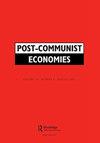语言技能与失业:后苏联时期拉脱维亚的双语现象
IF 1.8
3区 经济学
Q2 ECONOMICS
引用次数: 0
摘要
摘要本研究调查了工作年龄男性的失业与俄语、拉脱维亚语以及拉脱维亚最常用的外语英语技能之间的关系。为了确定劳动力市场中谁受益于哪种语言技能,该分析使用了欧盟统计局成人教育调查(AES 2016)和波罗的海社会科学研究所语言调查(BISS 2008)的数据。研究结果显示,拉脱维亚人和说俄语的人的语言技能和失业之间存在反比关系,但后者的关系更大。英语技能对没有高等学历的年长拉脱维亚工人有利,而对俄罗斯人来说,好处更大,也更普遍。拉脱维亚语技能使受过高等教育的说俄语的年轻人受益。对于拉脱维亚人来说,俄语技能和失业之间的联系仍然没有定论。该分析考虑了双语语境和自我报告语言技能的测量偏差。作者感谢第四届波罗的海经济协会会议、第十四届国际ECEE会议和第八届欧盟微数据用户会议的与会者提出的宝贵意见和建议。披露声明作者未报告潜在的利益冲突。数据可用性声明支持本研究结果的数据来自欧盟统计局(2016年成人教育调查)和波罗的海社会科学研究所(2008年语言调查)。从任何一个数据集得出的所有结论的责任完全在于作者。第一所俄国学校于1789年在里加成立。对国际清算银行2008年数据的分析也使用了基于两种语言在家庭交流中的使用和强度的双语变量。用有限的观察估计小样本产生不显著的结果。主要组成部分结合了AES(2016)中的拉脱维亚语/俄语和英语技能,以及bis(2008)语言调查中的接受和表达语言技能。拉脱维亚于2004年加入北大西洋公约组织(NATO)和欧盟,2014年采用欧元并加入欧洲货币联盟(EMU), 2016年成为经济合作与发展组织(OECD)成员。导致这些结果的研究已获得EEA补助金2014-2021波罗的海研究计划项目S-BMT-21-8 (LT08-2-LMT-K-01-073)的资助。该项目已获得欧盟地平线2020研究与创新计划的资助,资助协议编号为952574和Marie Skłodowska-Curie资助协议编号为734712。这项工作也得到了欧洲区域发展基金的支持,资助号为2014-2020.4.01.16-0032。本文章由计算机程序翻译,如有差异,请以英文原文为准。
Language skills and unemployment: post-Soviet bilingualism in Latvia
ABSTRACTThis study investigates the relationship between the unemployment of working-age men with their skills in the local languages, Russian and Latvian, and in English, the most spoken foreign language in Latvia. To determine who benefits and from which language skills in the labour market, the analysis uses data from the Eurostat Adult Education Survey (AES 2016) and the Baltic Institute of Social Sciences Language Survey (BISS 2008). The results show an inverse link between language skills and unemployment for Latvians and Russian speakers, but more so for the latter. English skills benefit the older Latvian workers without a tertiary degree, while for Russians the benefits are greater and more general. Latvian skills benefit the younger tertiary-educated Russian speakers. For Latvians, the link between Russian-language skills and unemployment remains inconclusive. The analysis considers the bilingual context and the measurement bias of self-reported language skills.KEYWORDS: Language skillsunemploymentpost-Soviet bilingualismLatviaRussian language minority AcknowledgmentsThe authors would like to thank the participants at the 4th Baltic Economic Association Conference, the 14th International ECEE Conference and the 8th European User Conference for EU-Microdata for their useful comments and suggestions.Disclosure statementNo potential conflict of interest was reported by the author(s).Data availability statementThe data that support the findings of this study are available from Eurostat (Adult Education Survey 2016) and the Baltic Institute of Social Sciences (Language Survey 2008). The responsibility for all conclusions drawn from either dataset lies entirely with the authors.Notes1. The first Russian school was founded in 1789 in Riga.2. The analysis on the BISS 2008 data also uses the bilingualism variable based on the use and intensity of both languages in communications at home.3. Estimating small samples with limited observations produces insignificant outcomes.4. The principal components combine the Latvian/Russian and English skills from the AES (2016) and receptive and expressive language skills from the BISS (2008) Language Survey.5. Latvia joined the North Atlantic Treaty Organisation (NATO) and the EU in 2004, adopted the euro and joined the European Monetary Union (EMU) in 2014 and became a member of the Organisation for Economic Cooperation and Development (OECD) in 2016.Additional informationFundingThe research leading to these results has received funding from the EEA Grants 2014-2021 Baltic Research Programme under project S-BMT-21–8 (LT08-2-LMT-K-01–073). This project has received funding from the European Union’s Horizon 2020 Research and Innovation programme under Grant Agreement No 952574 and the Marie Skłodowska-Curie Grant Agreement No 734712. This work was also supported by the European Regional Development Fund under Grant number 2014-2020.4.01.16-0032.
求助全文
通过发布文献求助,成功后即可免费获取论文全文。
去求助
来源期刊

Post-Communist Economies
ECONOMICS-
CiteScore
4.90
自引率
18.20%
发文量
21
期刊介绍:
Post-Communist Economies publishes key research and policy articles in the analysis of post-communist economies. The basic transformation in the past two decades through stabilisation, liberalisation and privatisation has been completed in virtually all of the former communist countries, but despite the dramatic changes that have taken place, the post-communist economies still form a clearly identifiable group, distinguished by the impact of the years of communist rule. Post-communist economies still present distinctive problems that make them a particular focus of research.
 求助内容:
求助内容: 应助结果提醒方式:
应助结果提醒方式:


